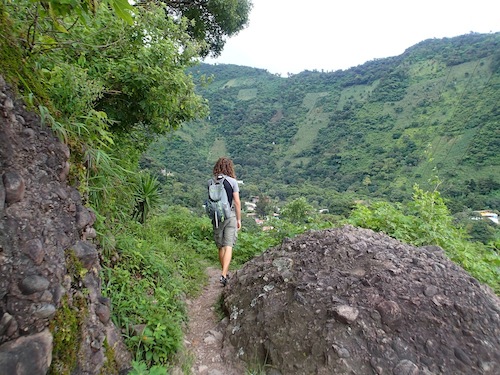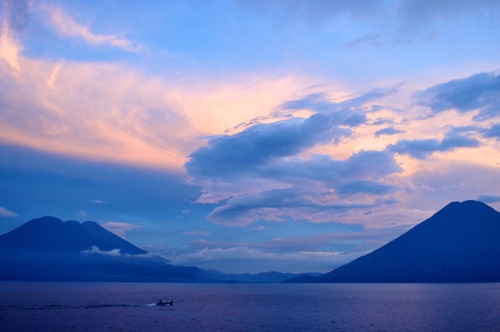Getting robbed and questioning connectedness
We turned the corner on the path and my heart immediately dropped. We had seen this man before. He passed us a while back, while we were taking pictures of our idyllic setting. Now here he was, standing amongst the corn, looking out over the lake, and waiting- for us. I knew something wasn’t right and I froze.
He mumbled one word: “dinero.” Aaron looked to me for a translation, not believing what was happening. “He wants your money”, I said simply. “Money, rapido!”, the man said. I registered, not for the first time, the machete in his hand, hanging at his side.
Everything I believe about people, about our connectedness, started to waiver and all I could see was that machete.
Aaron handed over his wallet and threw his hands up. I stayed frozen. I was hyper aware of every move, sound, and feeling but I did not move. The man approached me and I instinctively threw my hands up as well. He took the money out of my pocket, the machete still at his side, and ran off as soon as Aaron made a move towards us.
I exhaled and we took off. We practically ran over the thin path to the next town. Both of us were shaken and afraid that the man who had robbed us on a cloudy day on Lake Atitlan would follow us. He didn’t. He ran as fast in one direction as we ran in the other.
We felt angry, scared, and confused. Where did our beliefs about people fit into all of this? Where did our deep convictions on connectedness and the basic goodness of all people come into play? What exactly had just happened? We weren’t just robbed, it was as if our inner most thoughts had been exposed, challenged, and proven false.
We found a local cafe where we could re-group and I pulled my computer out of my backpack to work….. and stopped.
I had my computer, the one I had been carrying in my very visible backpack in an effort to search out a better internet connection in town. My camera, the same one the man who had robbed us had seen us using, was still dangling out of Aaron’s pocket. My wallet, holding an emergency 100 quetzales, was still floating around Aaron’s backpack. In fact, everything we had brought on our hike was still with us- minus the cash from our pockets.
I started replaying the event in my head. Thirty minutes ago I had been frozen in place focused on a man and a machete. Now I went back over the scene in my mind. He never raised his machete, in fact he seemed to forget he even had one, using his finger to point at us for emphasis. He never touched our backpacks; never reached for the camera whose red strap hand glaringly out of Aaron’s pocket. He never demanded more, accepting what was thrown easily in his direction. And when it was over, he ran. He ran as fast as we did.
Clarity started to overtake Aaron and I. We had just been robbed by a desperate man, likely out of work at the end of rainy season, not a career criminal. We had known enough to be grateful for our safety seconds after the attack, but what had eluded us in those first moments of escape was clarity and the ability to apply our connectedness with the man who had robbed us.
We will never know who that man was. We will never know his story or what ultimately led him to decide to wait for us on that path. What we do know, without a doubt, is that he never intended to hurt us- he just needed money. And ultimately, he needed that money more than us.
Understanding that even good people do questionable things when their backs are against a wall is a difficult lesson to internalize. The moment someone harms us, invades the sanctity of our space, or challenges our convictions, fear takes over and our instinctual response is to protect ourselves, physically, mentally, and emotionally. We make enemies out of men, turn the characters of the story into monsters, and delve into a realm of moral superiority that serves us in that moment. It separates “us” from “them”. It makes us feel better when we decide that the one who just attacked us or offended us was simply “bad”.
But what if the attackers aren’t “bad”? What if they are men and women with their backs against the wall and a family to feed? What if they are as scared of what they just did as the victims are? What if, in some situations, a closer examination blurs the line between “attacker” and “victim”? It’s an uncomfortable thought because it challenges the stories we create to protect ourselves. It also means that there might just be a day when that wall pushes against our own back and we do something we never thought we’d do.
There’s no way around it, getting robbed is no fun. But if travel has taught me anything it’s that our beliefs and our convictions cannot truly exist if they are never challenged and that every single situation, the good and the bad, are the puzzle pieces that make up the whole beautiful journey.
Travel is not always pretty. Neither is life in general. It’s the moments of clarity, sandwiched between the exceptional and the horrible, that make you think, for a moment or maybe more, that we are all just human beings at the end of the day and that we are all, truly, connected.
What might change and what might we gain if we stopped separating ourselves into “us” and “them” and started recognizing the common humanity we all share?



March 20th, 2014 at 1:03 am
I feel like this applies equally to a lot of the things people consider ‘nuisances’ when traveling in developing countries. Overcharged taxis, souvenirs at historic sites, everything; it can be hard to take time to consider the background of the people we’re dealing with in these situations!
March 20th, 2014 at 12:42 pm
SLioy… indeed. But I do think there’s a difference in being held up at knife point and price gauging on a cab in Bangkok, don’t you? Real theft, with threat of violence feels different than having an ipod or camera lifted out of your hotel room in Vietnam (happened to us). You’re very right about the necessity of thinking deeper than the surface. The motivating forces in the lives of desperate people can be powerful lessons.
March 20th, 2014 at 6:41 pm
Being held up at machete point certainly does feel differently than having something lifted from your room…. but only if you’ve experienced both! If you haven’t, then the theft without violence might still feel pretty awful, in the moment. It is such a challenge to keep perspective, dig deeper, and live in line with ones personal beliefs and ethics when your space or your being is violated.
March 20th, 2014 at 10:30 pm
I have lived in Mexico for 3 years now and while I have never been robbed I can see why it happens. In these developing countries there is no social assistance or government help for people to turn to when they fall on hard times in many cases……what are there options. I am sure many of them feel a moral dilemma but as you say, with families to feed what choice is there? what would we do if we were in that situation? I am glad that this unfortunate experience has not soured your feelings on travel.
April 12th, 2014 at 10:53 pm
Shelley, I couldn’t agree more. As awful as it felt in the moment, I can see how desperation can lead people to do things that they wouldn’t otherwise do. This experience is just one more stone on the path I am walking and it certainly hasn’t ruined the bigger picture for me!